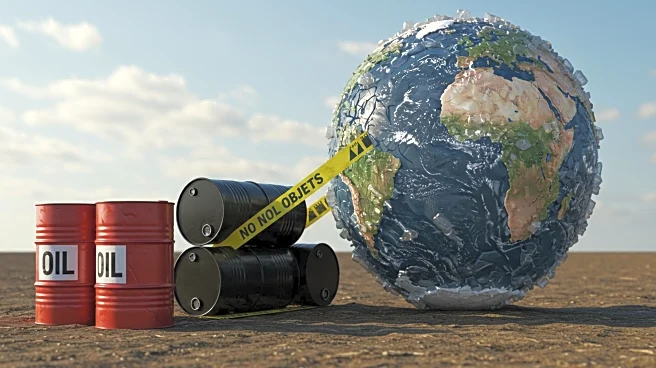What's Happening?
Recent UN talks aimed at establishing the first legally binding agreement to tackle plastic pollution have collapsed. The United States, alongside petrostates such as Saudi Arabia and Kuwait, played a significant role in obstructing the agreement. These countries insisted that actions should focus solely on waste management rather than curbing plastic production and the use of toxic chemicals. Despite growing awareness of the dangers posed by microplastics, which have been linked to various health issues, plastic production is expected to triple within the next 35 years. The failure to reach a consensus decision has prevented necessary action, leaving high-ambition states like those in the EU, Britain, Canada, and the global south disappointed.
Why It's Important?
The collapse of these talks is a setback for global environmental efforts, particularly in addressing the pervasive issue of plastic pollution. The decision to block a binding agreement highlights the influence of entrenched industry interests and the challenges faced by environmental advocates. The continued increase in plastic production poses significant risks to human health and the environment, with microplastics found in various human tissues and linked to serious health conditions. The inability to reach an agreement underscores the difficulties in achieving multilateral cooperation on environmental issues, potentially delaying necessary actions to mitigate the impact of plastics.
What's Next?
Despite the setback, countries and environmental campaigners are expected to continue their efforts to reduce plastic usage through unilateral actions and within regional blocs. Some nations, like Colombia, are already taking significant steps independently. There is hope that another UN forum might be more successful in reaching an agreement. Additionally, China, as a major producer of plastics, could play a pivotal role in shifting the global stance on this issue, potentially positioning itself as a leader in environmental reform.
Beyond the Headlines
The presence of a record number of industry lobbyists at the Geneva talks highlights the entrenched interests that environmental advocates must contend with. However, it also indicates that plastics producers recognize the growing momentum for change. The ongoing battle against these interests is crucial for achieving meaningful environmental reform, and the failure of the talks serves as a reminder of the challenges in balancing economic interests with environmental sustainability.










